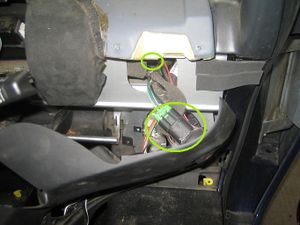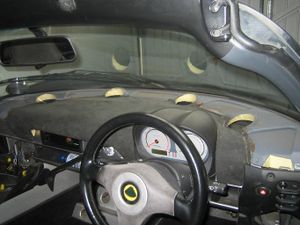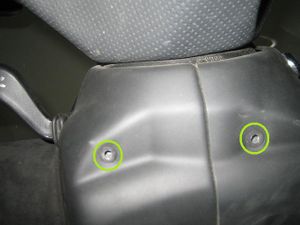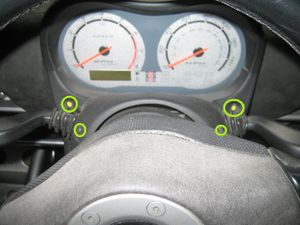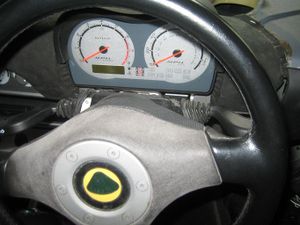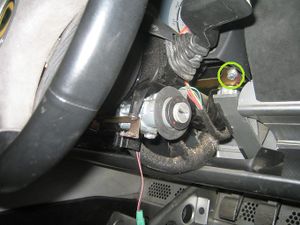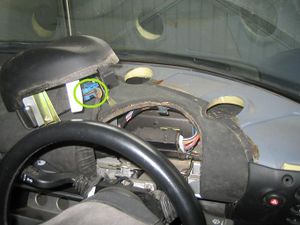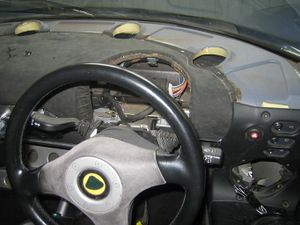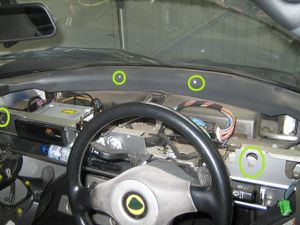Remove S2 Dash Top
How to remove the dash top from an S2 Elise
The process is described in the S2 Service Manual, section BP pages 19-21. My car (2002 model) was a little different to the manual however so the following guide might be useful.
Remove both front speaker grilles and speakers
Straightforward.
Remove both speaker panels
On the driver's side one you will need to disconnect the hazard warning light switch. The manual says to disconnect everything but it's not needed (and not obvious to me how to disconnect the light switches anyway - didn't want to break anything !) The picture below shows what to disconnect (lower green circle)
Remove plastic capping panel
The manual says to remove the air vents from the panel. Only the topmost rotating bit needs to be removed here. On my car there were 2 screws in each vent attaching the capping panel to the dash fascia panel. These are not mentioned in the manual, and will need to be removed. The capping panel can then be pulled free (with a bit of force !)
Remove the two screws holding the dash fascia to the frame. The drivers side one is shown on the picture above (upper green circle), and the passenger one is found likewise.
Remove steering column upper and lower shrouds
The lower shroud is held on by two screws (on my car anyway - the manual says 3 screws...), as shown below. The manual says to disconnect the trip button but I didn't see a need to - the wire is long enough to let the shroud rest on the floor while you continue working
The upper shroud is held on by four screws as shown below
]
Remove instrument pack
The instrument pack is secured by two bolts (M11 IIRC), one of which is shown below
Disconnect the wiring harness from the instrument pack
Remove dash top
The manual says to remove the plastic finished above the climate controls : I did this but not entirely sure it was required. UPDATE: yes, this is required. As well as holding the plastic finish to the dash, it also secures the top of the dash to the metal frame of the front of the dash.
Now remove the dash top by lifting the near most edge of the dash (to release the locating bosses from the keyhole slots in the dash) and pulling it towards you.
Alternative dash removal method without removing plastic capping panel
Instead of removing the plastic capping panel as described above, it is possible to get the entire dash out with the plastic capping panel attached.
Instead of removing the plastic capping panel, just remove the 4 screws that hold the ends of the plastic capping panel to the front of the dashboard. There are 2 screws at each end of the dash, above where the speakers go.
Remove the steering column shrouds, instrument pack and plastic finish above the climate controls (as described above.)
You can then gently bend or bow the plastic capping panel inwards at both ends, whilst moving the whole dash board to the right (drivers side), and slipping the left (passenger side) end out past the windscreen pillar. To avoid risk of scuffing the left pillar a piece of cloth can first be placed over the end of the capping panel where it will rub the pillar, although the windscreen pillar appears to be pretty tough material and hard to scuff.
Re-fitting
Basically the reverse of the above. Only tricky bit is re-assembling the steering column shrouds and instrument pack : loosely assemble the shrouds first before replacing the instrument pack and then tighten everything up.
The image below shows the keyhole slots (bottom green circles) and spigot pin holes (top green circles) that the dash top slots into on refitting.
